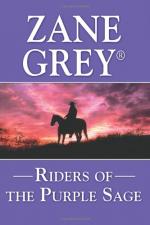“Son, it ain’t likely—it ain’t likely. Well, Bess Oldrin’—Masked Rider—Elizabeth Erne—now you climb on Black Star. I’ve heard you could ride. Well, every rider loves a good horse. An’, lass, there never was but one that could beat Black Star.”
“Ah, Lassiter, there never was any horse that could beat Black Star,” said Jane, with the old pride.
“I often wondered—mebbe Venters rode out that race when he brought back the blacks. Son, was Wrangle the best hoss?”
“No, Lassiter,” replied Venters. For this lie he had his reward in Jane’s quick smile.
“Well, well, my hoss-sense ain’t always right. An’ here I’m talkie’ a lot, wastin’ time. It ain’t so easy to find an’ lose a pretty niece all in one hour! Elizabeth—good-by!”
“Oh, Uncle Jim!...Good-by!”
“Elizabeth Erne, be happy! Good-by,”
said
Jane.
“Good-by—oh—good-by!” In lithe, supple action Bess swung up to Black Star’s saddle.
“Jane Withersteen!...Good-by!” called Venters hoarsely.
“Bern—Bess—riders of the purple sage—good-by!”
CHAPTER XXII. RIDERS OF THE PURPLE SAGE
Black Star and Night, answering to spur, swept swiftly westward along the white, slow-rising, sage-bordered trail. Venters heard a mournful howl from Ring, but Whitie was silent. The blacks settled into their fleet, long-striding gallop. The wind sweetly fanned Venters’s hot face. From the summit of the first low-swelling ridge he looked back. Lassiter waved his hand; Jane waved her scarf. Venters replied by standing in his stirrups and holding high his sombrero. Then the dip of the ridge hid them. From the height of the next he turned once more. Lassiter, Jane, and the burros had disappeared. They had gone down into the Pass. Venters felt a sensation of irreparable loss.
“Bern—look!” called Bess, pointing up the long slope.
A small, dark, moving dot split the line where purple sage met blue sky. That dot was a band of riders.
“Pull the black, Bess.”
They slowed from gallop to canter, then to trot. The fresh and eager horses did not like the check.
“Bern, Black Star has great eyesight.”
“I wonder if they’re Tull’s riders. They might be rustlers. But it’s all the same to us.”
The black dot grew to a dark patch moving under low dust clouds. It grew all the time, though very slowly. There were long periods when it was in plain sight, and intervals when it dropped behind the sage. The blacks trotted for half an hour, for another half-hour, and still the moving patch appeared to stay on the horizon line. Gradually, however, as time passed, it began to enlarge, to creep down the slope, to encroach upon the intervening distance.
“Bess, what do you make them out?” asked Venters. “I don’t think they’re rustlers.”
“They’re sage-riders,” replied Bess. “I see a white horse and several grays. Rustlers seldom ride any horses but bays and blacks.”




